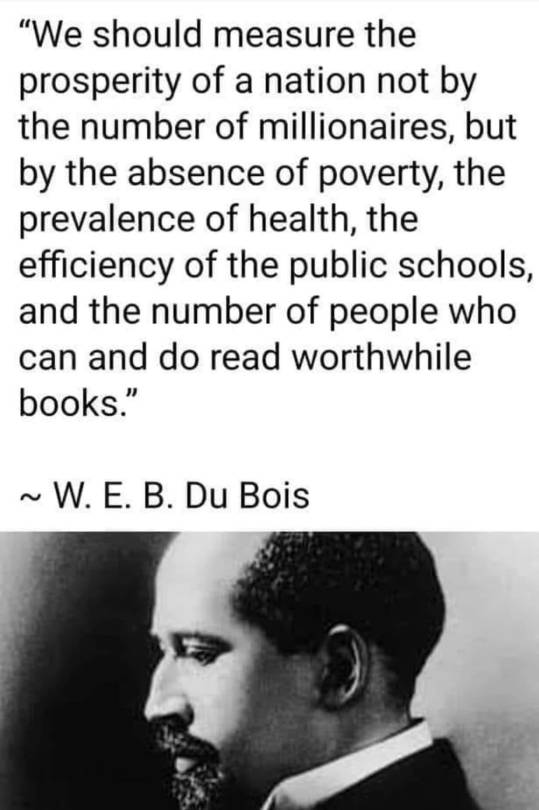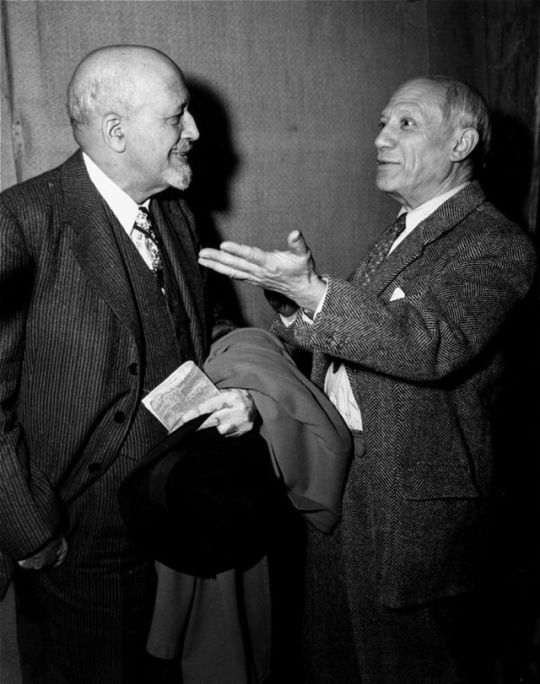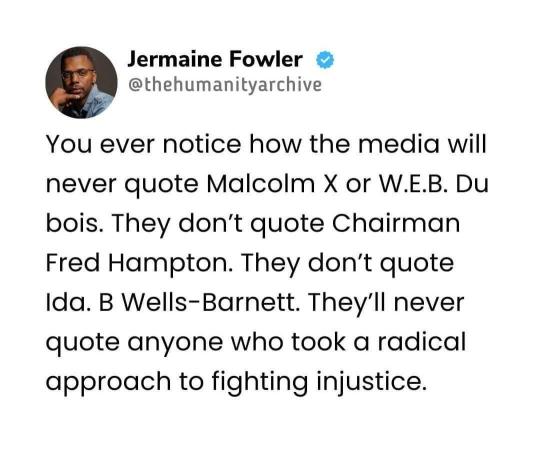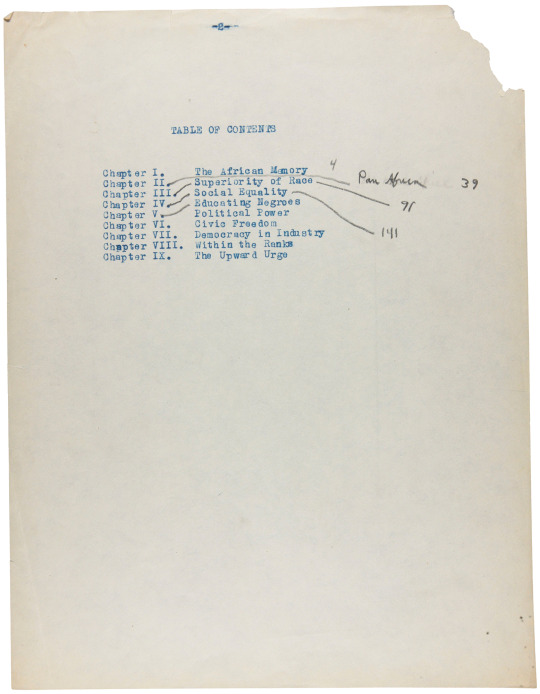#w. e. b. du bois
Text

311 notes
·
View notes
Text

W. E. B. Du Bois, February 23, 1868 – August 27, 1963.
With Pablo Picasso in 1949.
22 notes
·
View notes
Text
Hear my cry, O God the Reader; vouchsafe that this my book fall not still-born into the world wilderness. Let there spring, Gentle One, from out its leaves vigor of thought and thoughtful deed to reap the harvest wonderful.
—W. E. B. Du Bois, The Souls of Black Folk
10 notes
·
View notes
Photo

“The Star of Ethiopia” — A Pageant, 1915.
#the star of ethiopia#pageant#theater plays#ancient civilizations#ancient egypt#ethiopia#golden age#ruins of the empire#african culture#african history#moorish history#kingdoms#empires#world rulers#royal families#w. e. b. du bois#1900s#pamphlet
54 notes
·
View notes
Text
#ella josephine baker#ella baker#civil rights activist#human rights advocate#grassroots organizing#leadership philosophy#mentorship#student nonviolent coordinating committee (sncc)#w. e. b. du bois#thurgood marshall#a. philip randolph#martin luther king jr.#diane nash#stokely carmichael#bob moses#radical democracy#social justice#racial equality#gender equality#civil rights movement
3 notes
·
View notes
Quote
I shall not go to the polls. I have not registered. I believe that democracy has so far disappeared in the United States that no "two evils" exist. There is but one evil party with two names, and it will be elected despite all I can do or say.
W. E. B. Du Bois

53 notes
·
View notes
Text

5 notes
·
View notes
Photo

CATALYST JOURNAL
W. E. B. Du Bois’s Black Reconstruction in America, 1860–1880 is one of the greatest modern studies of revolution and counterrevolution. While it deserves its place alongside the classics, it is also an extraordinary example of a materialist and class analysis of race under capitalism. In recent years, the latter aspect of the book has been obscured and even denied. This essay seeks to restore Du Bois’s great work to its rightful place on both counts.
W. E. B. Du Bois’s magnum opus, Black Reconstruction in America, 1860–1880, published in 1935, is one of the greatest scholarly studies of revolution and counterrevolution.1 It deserves a place on one’s bookshelf next to other modern classics, including Leon Trotsky’s History of the Russian Revolution, C. L. R. James’s The Black Jacobins, Georges Lefebvre’s The Coming of the French Revolution, and Karl Marx’s Eighteenth Brumaire of Louis Bonaparte. Scholars of revolutions, unfortunately, have not usually considered the US Civil War to be one of the great social revolutions of the modern era, akin to the French, Russian, and Chinese revolutions. Many readers, in fact, view Du Bois’s book much more narrowly, as a response to white-supremacist histories of the Reconstruction era (1865–76) and, more particularly, a defense of the role of African American politicians — and the black voters who elected them — in the Southern state governments of that time. Du Bois does present such a defense, but Black Reconstruction offers much, much more than this.
Black Reconstruction is not only a towering work of history but also a work firmly embedded in the Marxist tradition. Du Bois reinterprets the Civil War as a social and political revolution “from below” — a workers’ revolution — that brought about the overthrow of both slavery and the Confederate state, thereby opening a door to interracial democracy in the South. The book then reinterprets the subsequent overthrow of this democracy as a class-based counterrevolution that destroyed the possibility of freedom for half the Southern working class and imposed a “dictatorship of capital” that brought about “an exploitation of labor unparalleled in modern times.”2
But why should one read Black Reconstruction in the twenty-first century? In short, because Du Bois is writing about issues that remain of tremendous political importance, including the nature of racial oppression and the racism of white workers. Unlike most contemporary analysts of race, moreover, Du Bois approaches these issues from the perspective of political economy. He rejects an approach to racial oppression that starts with prejudice, discrimination, or culture, trying instead to dig beneath these and understand how they are rooted in the material interests of different classes. Instead of insisting on the separation of race from class, as so many liberals do, Du Bois insists on their intimate connection.3
Black Reconstruction is rightly famous for stressing the collective agency of enslaved people in winning their own freedom and for its impassioned rebuttal of racist historiography. What has been less emphasized is the way in which Du Bois very explicitly rejects analyses of the Civil War and Reconstruction that emphasize race and racism as the primary drivers of historical events. Racism certainly played a hugely important role in that era, Du Bois argues, but it was a product of — and usually disguised — another, more powerful force: capitalism. More specifically, Du Bois argues in Black Reconstruction that two characteristic features of capitalism — capitalists’ competition for labor and workers’ competition for jobs — are the root cause of conflicts that seem to be driven by racism.
This perspective on Du Bois’s masterpiece runs counter to some influential interpretations of his work. Not surprisingly, there is resistance in some quarters to stating plainly that Black Reconstruction is a work of Marxism. Many people who come to Black Reconstruction for the first time are not expecting to read a Marxist text. They have most likely read Du Bois’s earlier collection of essays, The Souls of Black Folk, which precedes his turn to Marxism by three decades.4 While a number of authors do recognize Du Bois’s Marxism,5 many others deny that Black Reconstruction or his subsequent writings are Marxist. In 1983, for example, Cedric Robinson described Du Bois as a “sympathetic critic of Marxism.”6 Gerald Horne’s 1986 book examines in great detail Du Bois’s involvement in leftist (mainly Communist) causes after World War II, but he never offers an opinion as to whether Du Bois was a Marxist.7 And Manning Marable’s book on Du Bois, published just a few months later, portrays him as a “radical democrat” — although Marable later suggested that Du Bois might usefully be viewed as part of the “Western Marxist” tradition.8
More recently, a group of “Du Boisian” sociologists recognizes that Du Bois integrates some elements of Marxist thinking into his worldview. But according to these writers, not only is Du Bois not a Marxist but his ideas clearly transcend Marx’s. Marx gave theoretical primacy to class, they say, whereas Du Bois grasped the “intersectionality” of class and race, emphasizing their connections while giving theoretical primacy, by implication, to neither.9 According to these writers, this theoretical move allowed Du Bois, unlike Marx and his followers, they claim, to understand colonialism, the ways in which race “fractures” class consciousness, and racial oppression generally.10
In this essay, I argue that these “Du Boisians” and others who deny Du Bois’s Marxism are wrong. Du Bois actually does give theoretical primacy to capitalism. In both Black Reconstruction and his subsequent writings, Du Bois repeatedly emphasizes how racial oppression is a product of capitalism. Time and again, furthermore, Du Bois takes issue with what we would today call “race reductionism,” that is, attempts to explain historical events primarily in terms of race. His rejection of race reductionism only deepened in the years after Black Reconstruction’s publication.
After 1935, in short, “Du Boisianism” is Marxism. Du Bois’s failure lay not in the fact that he embraced a Marxist orientation but that he came to uncritically support Soviet authoritarianism. This was perhaps the greatest tragedy, in my view, of Du Bois’s long life. But the main point of this essay is to show that, despite all efforts to ignore or deny his Marxism, Black Reconstruction stands as a brilliant work of class analysis.
BLACK RECONSTRUCTION IN AMERICA
Du Bois’s turn toward Marxism occurred rather late in his life, shortly before the publication of Black Reconstruction. His trip to the Soviet Union in 1926, months before Joseph Stalin’s consolidation of power, certainly pushed him in this direction. “Never before in life,” writes his biographer David Levering Lewis, “had he been as stirred as he would be by two months in Russia.”11 Du Bois traveled more than two thousand miles across the Soviet Union, “finding everywhere … signs of a new egalitarian social order that until then he had only dreamt might be possible.”12 “I may be partially deceived and half-informed,” Du Bois wrote at the time. “But if what I have seen with my own eyes and heard with my ears in Russia is Bolshevism, I am a Bolshevik.”13 (Du Bois would visit the Soviet Union again in 1936, 1949, and 1958.)
Du Bois later wrote that his trip to the Soviet Union led him to question “our American Negro belief that the right to vote would give us work and decent wage,” or would abolish illiteracy or “decrease our sickness and crime.”14 Only a revolution, by implication, could attain these ends. Du Bois also now believed that “letting a few of our capitalists share with whites in the exploitation of our masses, would never be a solution of our problem.”15 Black liberation was impossible, in sum, so long as the United States remained a capitalist society, and “black capitalism” was a dead end.
Du Bois had been broadly familiar with Marxist ideas since his graduate student days at Harvard and in Berlin. But it was not until 1933, in the midst of the greatest crisis of capitalism in world history, that Du Bois began conscientiously to study Marx, Friedrich Engels, and Vladimir Lenin. He was then sixty-five years old. As Lewis writes, Du Bois fell hard for Marxist analysis:
Like so many intellectuals in the thirties who broadcast Marxism as a verifiable science of society, the Atlanta professor was mesmerized by dialectical materialism. Calling Marx the “greatest figure in the science of modern industry,” Du Bois seemed to rediscover with the avidity of a gifted graduate student the thinker who Frank Taussing, his Harvard economics professor, had smugly ignored. Marx made history make sense — or more sense, Du Bois came to believe, than all other analytical systems.16
Du Bois was prodded to master Marxist theory by the rise of a group of so-called Young Turks within the National Association for the Advancement of Colored People (NAACP), the civil rights organization he helped found. These young scholar-activists, including Abram Harris, Ralph Bunche, and E. Franklin Frazier (all members or soon-to-be members of the Howard University faculty) “were attempting to shift the Negro intelligentsia’s focus on race to an analysis of the economics of class.”17 All were convinced that a powerful interracial labor movement was necessary to smash racial oppression, and they were critical of the NAACP for its lack of an economic program. Members of this group would offer advice to Du Bois about which texts were essential for him to read. Harris’s book, The Black Worker: The Negro and the Labor Movement, coauthored with Sterling Spero, proved particularly influential; it was no coincidence that Du Bois titled the first chapter of Black Reconstruction “The Black Worker.”18 (I discuss the precise significance of this below.)
(Continue Reading)
#politics#the left#w. e. b. du bois#race#class#capitalism#racism#black history#black history month#history#marxism#socialism#democratic socialism#catalyst#catalyst journal
21 notes
·
View notes
Quote
What is Africa to me? Once I should have answered the question simply: I should have said 'fatherland' or perhaps better 'motherland' because I was born in the century when walls of race were clear and straight; when the world consisted of mutually exclusive races; and even though the edges might be blurred, there was no question of exact definition and understanding of the meaning of the word. […]
Since then the concept of race has so changed and presented so much of contradiction that as I face Africa I ask myself: what is it between us that constitutes a tie which I can feel better than I can explain? Africa is, of course, my fatherland. Yet neither my father nor my father's father ever saw Africa or knew its meaning or cared overmuch for it. My mother's folk were closer and yet their direct connection, in culture and race, became tenuous; still, my tie to Africa is strong. On this vast continent were born and lived a large portion of my direct ancestors going back a thousand years or more. The mark of their heritage is upon me in color and hair. These are obvious things, but of little meaning in themselves; only important as they stand for real and more subtle differences from other men. Whether they do or not, I do not know nor does science know today.
But one thing is sure and that is the fact that since the fifteenth century these ancestors of mine and their other descendants have had a common history; have suffered a common disaster and have one long memory. The actual ties of heritage between the individuals of this group, vary with the ancestors that they have in common and many others: Europeans and Semites, perhaps Mongolians, certainly American Indians. But the physical bond is least and the badge of color relatively unimportant save as a badge; the real essence of this kinship is its social heritage of slavery; the discrimination and insult; and this heritage binds together not simply the children of Africa, but extends through yellow Asia and into the South Seas. It is this unity that draws me to Africa.
W. E. B. Du Bois, Dusk of Dawn: An Essay Toward an Autobiography of a Race Concept (1940)
11 notes
·
View notes
Text

The Souls of Black Folk by W. E. B. Du Bois
Aquarius: "Piggies"
3 notes
·
View notes
Text

W. E. B. Du Bois, Dusk of Dawn. How Black America is Freeing Itself and of the World That Faces This Freedom, [Table of Contents], (draft), n.d. [W. E. B. Du Bois Collection, Folder 27, Yale University Library, Beinecke Rare Book and Manuscript Library, New Haven, CT]
#manuscript#draft#history#historiography#sociology#notation#w. e. b. du bois#w. e. b. du bois collection#yale university library#beinecke rare book and manuscript library#no date
26 notes
·
View notes
Text

W. E. B. Du Bois, February 23, 1868 – August 27, 1963.
With Shirley Graham Du Bois at the May Day parade in Moscow’s Red Square in 1959.
33 notes
·
View notes
Text
Historians owe everything to sociologists and philosophers… sociologists I am kissing you on the mouth so gently
#literally where the fuck would we be without:#Patricia hill collins#kimberlé Crenshaw#gayatri chakraborty#gayatri spivak#michel foucault#judith butler#pierre bourdieu#antonio gramsci#W. E. B. Du Bois#jurgen habermas#as a historian…. we can’t theorise for shit#all we do is steal y’all’s theories and apply them to different historical contexts#academia#post grad#post graduate#history#sociology#humanities#social science#philosophy#Karl Marx#Marxism
57 notes
·
View notes
Text

Poem by W.E.B.(William Edward Burghardt) Du Bois. "The Quadroon"published in"The Crisis,"magazine,November 1911
10 notes
·
View notes
Text
(PDF) W.E.B. DuBois. Chapter XVII of Black Reconstruction in America (1935).
2 notes
·
View notes